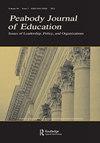“我不喜欢给它贴上标签”:激进主义、政治认同的发展和学生政治流畅性的培养
Q2 Social Sciences
引用次数: 0
摘要
基于对来自四个地理和政治上不同的公共机构的39名参与者的密集访谈,本研究描述了“学生政治流畅性”的概念,这是基于建构主义理论开发的核心类别。政治流畅性的发展反映了学生在其政治知识和行动基础上的专业知识,这些知识和行动是由他们突出的社会身份所告知的,并由他们期望的政治结果所背景化的。在大学环境中,学生政治流畅性的发展分为四个阶段,包括政治激励体验、认知谈判、应用政治认同和政治认同一致性。在新概念的指导下,政策和实践的影响引起了人们对最佳策略和策略的关注,这些策略和策略鼓励公平形式的校园政治教学法,从而实现政治动态和包容性的校园氛围,这有助于实现一系列理想的个人和社会结果。本文章由计算机程序翻译,如有差异,请以英文原文为准。
“I don’t like to put labels on it”: Activism, Political Identity Development, and the Cultivation of Student Political Fluency
ABSTRACT Based on intensive interviews with 39 participants across four geographically and politically diverse public institutions, this study describes the concept of “student political fluency,” the core category developed using constructivist grounded theory. The development of political fluency reflects the expertise a student has based on their political knowledge and actions, informed by their salient social identities, and contextualized by their desired political outcome(s). Four phases frame the development of student political fluency within the collegiate environment, including politically motivating experiences, cognitive negotiation, applying political identity(ies), and political identity congruence. Informed by the new concept, implications for policy and practice draw attention to optimal strategies and tactics that encourage equitable forms of campus-based political pedagogy leading to the realization of a politically dynamic and inclusive campus climate, which can contribute to a range of desirable individual and societal outcomes.
求助全文
通过发布文献求助,成功后即可免费获取论文全文。
去求助
来源期刊

Peabody Journal of Education
Social Sciences-Education
CiteScore
2.20
自引率
0.00%
发文量
43
期刊介绍:
Peabody Journal of Education (PJE) publishes quarterly symposia in the broad area of education, including but not limited to topics related to formal institutions serving students in early childhood, pre-school, primary, elementary, intermediate, secondary, post-secondary, and tertiary education. The scope of the journal includes special kinds of educational institutions, such as those providing vocational training or the schooling for students with disabilities. PJE also welcomes manuscript submissions that concentrate on informal education dynamics, those outside the immediate framework of institutions, and education matters that are important to nations outside the United States.
 求助内容:
求助内容: 应助结果提醒方式:
应助结果提醒方式:


